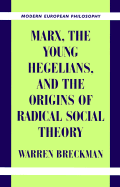Book contents
- Frontmatter
- Contents
- Acknowledgments
- Introduction
- 1 At the End of Idealism: From “Nihilism” to “Positive Philosophy”
- 2 The Transcendent Sovereign and the Political Theology of Restoration
- 3 Ludwig Feuerbach and Christian Civil Society
- 4 The Social and Political Discourse of Personality, 1835–1840
- 5 Pantheism, Social Question, and the Third Age
- 6 Arnold Ruge: Radical Democracy and the Politics of Personhood, 1838–1843
- 7 Karl Marx: From Social Republicanism to Communism
- Conclusion
- Bibliography
- Index
7 - Karl Marx: From Social Republicanism to Communism
Published online by Cambridge University Press: 11 January 2010
- Frontmatter
- Contents
- Acknowledgments
- Introduction
- 1 At the End of Idealism: From “Nihilism” to “Positive Philosophy”
- 2 The Transcendent Sovereign and the Political Theology of Restoration
- 3 Ludwig Feuerbach and Christian Civil Society
- 4 The Social and Political Discourse of Personality, 1835–1840
- 5 Pantheism, Social Question, and the Third Age
- 6 Arnold Ruge: Radical Democracy and the Politics of Personhood, 1838–1843
- 7 Karl Marx: From Social Republicanism to Communism
- Conclusion
- Bibliography
- Index
Summary
“Political democracy is Christian since in it man, not merely one man, but every man, ranks as sovereign, as the highest being, but it is man in his uncivilised, unsocial form, man in his fortuitous existence, man just as he is, man as he has been corrupted by the whole organisation of our society.” Read against the background of our discussion, these famous lines from Marx's “On the Jewish Question” are strikingly resonant. Arguably Marx's first great work of social and political critique, “On the Jewish Question” contains all the sociopolitical elements of the radical Hegelian critique of personalism: the association of Christianity with egoism, egoism with personalist sovereignty, personalist sovereignty with civil society. Familiar as the essay's rhetoric, themes, and conceptual configuration are, however, the object of critique has apparently shifted. For the target of Marx's attack is no longer Christian personalism or the restorationist theory of monarchic sovereignty but rather political modernity in the form of liberal democracy and its concept of individual autonomy. We have already seen that a number of radical Hegelians turned against liberalism in the period 1840 to 1843. In Marx's specific case, the critique of liberalism marked a crucial turning point in his development and in the history of political thought. Nonetheless, vital questions about this pivotal period in the emergence of Marxian socialism still lack satisfying answers. How did the transition from the critique of theologico-political conceptions of personality to the critique of liberal selfhood occur?
- Type
- Chapter
- Information
- Marx, the Young Hegelians, and the Origins of Radical Social TheoryDethroning the Self, pp. 258 - 297Publisher: Cambridge University PressPrint publication year: 1998

